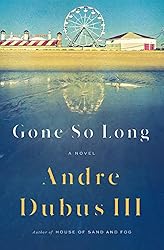Gone So Long (Dubus)
| Article Index | Summary | Author Bio | Book Reviews | Discussion Questions | Full Version |
|---|
Gone So Long
Andre Dubus III, 2018
W.W. Norton & Co.
480 pp.
ISBN-13: 9780393244106
Summary
Andre Dubus III’s first novel in a decade is a masterpiece of thrilling tension and heartrending empathy.Few writers can enter their characters so completely or evoke their lives as viscerally as Andre Dubus III.
In this deeply compelling new novel, a father, estranged for the worst of reasons, is driven to seek out the daughter he has not seen in decades.
Daniel Ahearn lives a quiet, solitary existence in a seaside New England town. Forty years ago, following a shocking act of impulsive violence on his part, his daughter, Susan, was ripped from his arms by police.
Now in her forties, Susan still suffers from the trauma of a night she doesn’t remember, as she struggles to feel settled, to love a man and create something that lasts.
Lois, her maternal grandmother who raised her, tries to find peace in her antique shop in a quaint Florida town but cannot escape her own anger, bitterness, and fear.
Cathartic, affirming, and steeped in the empathy and precise observations of character for which Dubus is celebrated, Gone So Long explores how the wounds of the past afflict the people we become, and probes the limits of recovery and absolution. (From the publisher.)
Author Bio
• Birth—1959
• Where—Oceanside, California, USA
• Education—B.S., Univ. of Texas; Univ. of Wisconsin
• Awards—Pushcart Prize; National Magazine Award-Fiction, 1985
• Currently—lives in Newberry, Massachusetts
Andre Dubus III is an American writer best known as the author of the novel House of Sand and Fog, which was a National Book Award finalist in 1999 and was made into a movie in 2003. His other books include Bluesman, a 1993 novel, and The Cage Keeper and Other Stories from 1989.
Dubus's work has been awarded a Pushcart Prize and the 1985 National Magazine Award for Fiction. It has also been included in "The One Hundred Most Distinguished Stories of 1993" and The Best American Short Stories of 1994. He was one of three finalists for the 1994 Prix de Rome given by the American Academy of Arts and Letters.
He started his college career at Bradford College (Massachusetts), where his father taught, before moving on to study sociology at the University of Texas. He eventually dropped out of a Ph.D. program in the theory of social change at the University of Wisconsin-Madison and then roamed the country working at a variety of jobs, including carpenter, construction worker, bounty hunter, bartender, counselor at a treatment center, and actor, before settling upon being a fiction writer.
He lives in Newbury, Massachusetts, with his wife, dancer and choreographer Fontaine Dollas, and their three children. He currently is on the adjunct faculty at the University of Massachusetts Lowell, where he teaches general writing, fiction, and directed study courses.
His father, Andre Dubus (1936-1999), was a well known writer of short stories and novellas, and his cousin is the mystery writer James Lee Burke. (From Wikipedia.)
Book Reviews
(Starred review) Dubus renders this story of love, jealousy, guilt, and atonement in a voice that rings with authenticity and evokes the texture of working-class lives.… This is a compassionate and wonderful novel.
Publishers Weekly
(Starred review) A dark and exquisitely crafted novel that views parental relationships as both a form of inherited violence and redemptive empathy. —Joshua Finnell, Colgate Univ., Hamilton, NY
Library Journal
Dubus evokes a dazzling palette of emotions…. Susan, Daniel, and Lois are fully realized and authentic characters… [in] this powerful testament to the human spirit asks what it means to atone for the unforgivable and to empathize with the broken.
Booklist
An ex-convict in his 60s pays a visit to the daughter he hasn't seen since the night he murdered her mother in 1973.… Ahearn is a uniquely sympathetic murderer, and the window we are given into Susan's memories and emotions …brings us very close to her as well.
Kirkus Reviews
Discussion Questions
We'll add publisher questions if and when they're available; in the meantime, use our LitLovers talking points to help start a discussion for GONE SO LONG … then take off on your own:
1. Did you find the number of Susan's flashbacks in the beginning of the novel confusing—perhaps trying to determine whether they were part of her novel or actual flashbacks? If so, did you finally settle in? Why might the author have used the technique—juxtaposing the two kinds of memories (some part of the novel and others in real-time)?
2. Have you ever experienced the types of flashbacks that Susan has, both in terms of the emotional content as well as the serial nature of them (one flashback leading to another)?
3. What do you think of Danny Ahearn? He's a murderer who killed his wife and the mother of his child. Does he deserve our sympathy? Does he deserve his daughter's and mother's-in-law sympathies?
4. It's forty years after Danny murdered Susan's mother. Talk about the lasting impact that trauma has had on Susan's life, both as a child and as an adult.
5. Follow-up to Question 4: Talk similarly about Lois, Susan's maternal grandmother and the mother of Linda. How has she dealt with her daughter's death over the years?
6. One of the primary questions this novel asks is whether redemption and forgiveness (is there a difference?) can ever come out of an act as horrific as Danny's?
7. Talk about the ending? What, if anything, is resolved? What is your opinion of how the novel ends?
(Questions by LitLovers. Please feel free to use them, online and off, with attribution. Thanks.)
Site by BOOM
![]()
LitLovers © 2024


